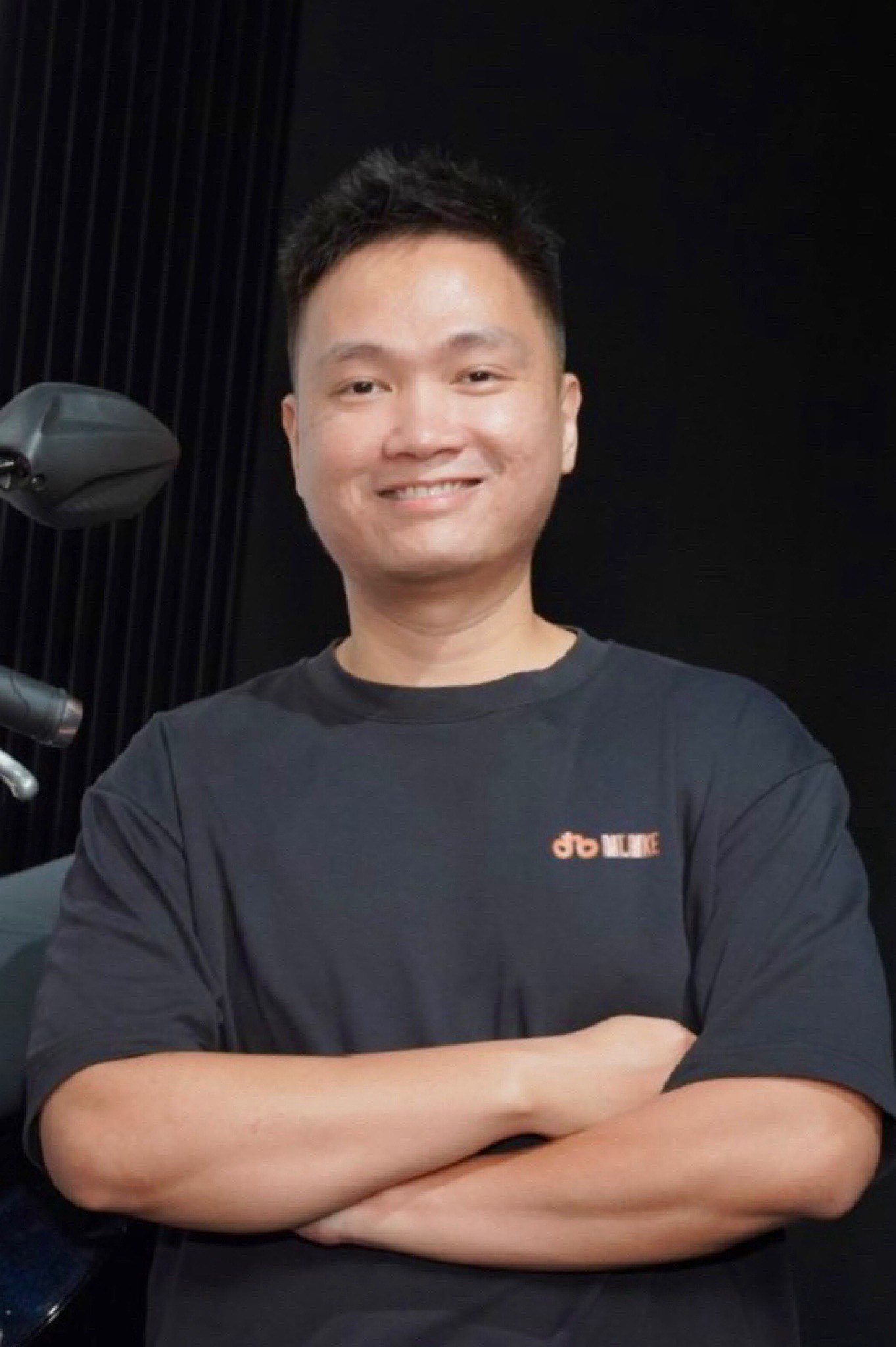Mr. Son Nguyen, CEO of Dat Bike Vietnam
Electric vehicles have become increasingly popular in recent years and have received significant attention and acceptance from consumers. Despite the economic challenges, the presence of electric motorcycles and cars on Vietnam’s streets has been steadily increasing, with a variety of models and price segments catering to different customer groups.

Dat Bike believes that Vietnam holds promise in developing an electric vehicle industry. Indeed, 80 per cent of two-wheeled electric vehicles produced in Southeast Asia are for the Vietnamese market. The proportion of electric two-wheelers out of the total number of two-wheelers in Vietnam is the highest in the region, at 10 per cent, while elsewhere it hovers at around 1 per cent. This presents a golden opportunity for Vietnam to become a bright spot in the electric vehicle supply chain and production throughout the region.
According to industry data on two-wheeler sales in 2023, the market experienced a 20 per cent decline due to the economic circumstances. However, some electric motorcycle manufacturers, including Dat Bike, posted stable revenue growth. Specifically, after the launch of the Dat Bike Quantum, a scooter model with a range of 270 km per charge and a quick four-hour charging time, sales in the first two months equaled those of the entire year prior.
Dat Bike believes this is a positive sign of the genuine demand among Vietnamese consumers for greener, smarter personal transportation options. This not only motivates Dat Bike to further research and develop products with superior performance, it also affirms the potential that Vietnam’s electric vehicle market holds, encouraging both domestic and international manufacturers and investors to seriously consider its development.
However, there are still some difficulties. Electric vehicle infrastructure remains a “work in progress” and requires time for optimization. Given the economic challenges and Dat Bike’s status as a startup focusing on product development and distribution, we aim to optimize the functionality and performance of our products. This includes ensuring that each electric bike we produce can travel long distances, of 270 km, and can be charged at home within a short timeframe, of four hours. This approach partially alleviates the pressure on charging infrastructure and fosters user habits, enhancing convenience for customers.
Dat Bike believes that both government agencies and domestic and international investors are genuinely studying and are interested in Vietnam’s electric vehicle industry. Existing policies demonstrate the country’s commitment at COP26 regarding net-zero emissions, and electric vehicles have received various tax incentives. We hope that future policies will expand to cover two-wheeled electric vehicles and attract more investment in the electric vehicle ecosystem.
We have noted that numerous efforts to build charging infrastructure, service points, community support programs, and educational initiatives about electric vehicle usage, initiated by users themselves, have been spreading within Vietnam’s electric vehicle community.
Dat Bike plans to ramp up production of the Quantum, to meet pending orders. Simultaneously, the company aims to collaborate with distribution partners to expand and develop more experiential stores and service networks to better serve consumers. Dat Bike is also preparing for exports, with Indonesia its first target destination in the region, which is expected to happen in late 2025.
Mr. Nguyen Huu Phuoc Nguyen, Co-Founder & CEO of Selex Motors
Vietnam’s electric vehicle market is currently in a relatively nascent stage. Evidence shows that vehicles using fossil fuels still dominate. However, it can’t be denied that electric vehicles have made significant progress. This is evident in the government’s net-zero policies as well as financial support policies from various international organizations such as the United Nations Development Program (UNDP)
Businesses have shown a certain level of interest in reducing emissions and waste. We can therefore see a shift towards green vehicles in some businesses and among individuals concerned about environmental protection and sustainable development.

However, there are still barriers preventing electric vehicles from completely replacing gasoline vehicles, including inconvenience (long charging times ranging from three to eight hours), high costs (battery costs accounting for up to 50 per cent), and, compared to motorcycles, electric vehicles don’t offer many differences in models.
In my opinion, Vietnam’s electric vehicle market will experience significant development in 2024. When the market has a product that effectively addresses the above-mentioned barriers, especially the inconvenience of waiting for charging, electric vehicles will completely win over consumers.
Especially as people tighten their spending, electric motorcycles are sure to gain in popularity due to their cost-effectiveness and convenience.
Based on feedback from customers who have used electric vehicles, most report saving 30-40 per cent on fuel costs per month after the switch. The more they travel, the more they save. The amount of money saved in a year can help customers buy a new motorcycle.
Therefore, our customers, after experiencing electric vehicles for one or two months, decide to buy a Selex motorcycle to save on fuel costs.
Selex Motors recently signed a strategic cooperation agreement with Samsung SDI, becoming the first electric vehicle brand in Vietnam to be supplied with genuine battery cells and to cooperate in battery development for other partners. Samsung SDI is one of the world’s leading companies in manufacturing and providing electric vehicle batteries and in energy storage, and is a partner of many global brands such as Audi, Volkswagen, Ford, and Hyundai. In beginning this cooperation, Samsung SDI spent over a year observing and evaluating capabilities. This cooperation partly demonstrates our manufacturing capacity, development potential, and product quality. For Selex Motors, the agreement with Samsung SDI was an important step forward in ensuring the highest commitment to safety and product quality.
For Vietnam’s electric motorcycle market, this cooperation also shows the trust of world-class partners in domestic companies and opens up development opportunities, which is a business milestone for electric motorcycles in the domestic market and the region.
Selex Motors and Samsung SDI aim to build a battery exchange network that Selex is pioneering to develop into shared energy infrastructure, which is a vital sharing aspect in Vietnam and the region. When the battery exchange network develops extensively, battery exchanges will be more convenient than refueling, and people are sure to quickly switch from gasoline to electric vehicles.
However, there remain quite a few difficulties. There are not many support policies or plans for developing battery exchanges and energy networks to develop electric vehicle systems, so there are many issues regarding implementation.
Additionally, battery exchange stations must be placed in public, convenient traffic locations with power sources, so building, installing, and operating stations will be quite challenging. We have to work on everything, from determining locations to working with authorities to get them set up.
Many countries around the world have support policies for businesses to develop electric vehicles, so developing and popularizing ecosystem products in those countries is more favorable.
For Selex, batteries as well as the battery exchange network are the core products of the ecosystem and play a key role in promoting the switch from gasoline to electric vehicles. In 2024, we will continue to vigorously develop the battery exchange network nationwide, with an additional 300 exchange points in major cities, ensuring that battery exchange is as convenient as refueling.
At the same time, we will cooperate with some manufacturers to help other brands switch to using the battery exchange network. This year, the company will also start expanding market activities to some countries in Southeast Asia.
Representative from VinFast
Like electric cars, VinFast’s electric motorbikes boast three core values that act as our competitive advantage: premium quality products, inclusive pricing, and outstanding after-sales services.
In terms of products, all VinFast electric motorbikes feature stylish designs created by renowned studios, meeting the needs of diverse customer groups. Moreover, all of our motorbikes are equipped with LFP batteries, offering a range of over 200 km per charge, which is on par with gasoline motorbikes. Importantly, LFP batteries are completely explosion-proof, ensuring user safety.
With a top speed of up to 90 kph, VinFast electric motorbikes deliver performance comparable to conventional gasoline models, while offering significant environmental benefits. They are eco-friendly, producing no odor, exhaust fumes, vibrations, or skin burns.
Furthermore, VinFast electric motorbikes are equipped with a variety of features, including smart technology and superior safety compared to their gasoline competitors. These features include battery management, charging status display, error diagnosis, remote software updates, and the option to pay monthly battery rental fees via an app.
In terms of price, VinFast electric motorbikes currently offer a range of high-end product lines spanning various price segments, from VND18 million to over VND63 million. Notably, the Evo200 series, starting at only VND18 million, and the Evo200 Lite version cater specifically to students, making them a popular and accessible choice for everyone. Additionally, monthly battery rental and electricity costs for VinFast electric motorbikes have been proven to be lower than the fuel costs of gasoline competitors in the same segment, while maintenance costs are only one-quarter to one-third of those associated with gasoline motorbikes.
VinFast’s after-sales service and customer care are widely regarded as the best in Vietnam’s car market. We offer a comprehensive network of showrooms, agents, and service workshops spanning all of the country’s 63 cities and provinces. VinFast also provides mobile services, offering maximum support to customers throughout their vehicle ownership experience.
Despite a decline in sales in Vietnam’s two-wheeled vehicle market over recent years, due to a shift towards cars, the demand for electric motorbikes continues to rise. This is driven by a growing population increasingly aware of environmental responsibility. This trend is expected to see a decline in gasoline motorbike sales and strong growth in the electric motorbike segment in the years ahead.
Furthermore, despite the decline, Vietnam’s two-wheeled vehicle market remains one of the largest globally, with consumption at approximately 3 million vehicles a year. This presents a significant opportunity for VinFast’s electric motorbikes to capture market share and achieve strong growth in the years to come, given the large size of Vietnam’s two-wheeled vehicle market.
However, the greatest challenge for VinFast and other electric vehicle brands is to transform consumer habits and awareness. This is crucial to accelerating the green transformation of transportation by replacing traditional gasoline and oil-powered vehicles with electric vehicles.
Furthermore, the market is currently flooded with products of unknown origin and poor quality selling at cheap prices. This not only harms consumer and businesses’ rights but also creates misconceptions about the quality of genuine electric motorbikes like those from VinFast. Therefore, VinFast needs to not only compete with gasoline vehicles but also educate consumers about the drawbacks of low-quality and cheap alternatives to ensure informed decision-making.








 Google translate
Google translate